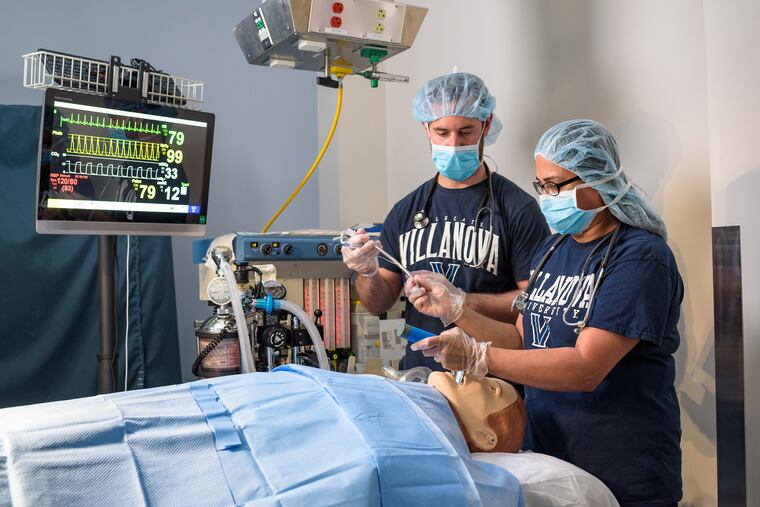Montgomery County has hundreds of health-care jobs going unfilled
Three out of the top five employers in Montgomery County are in health care. “We need nurses and there will be a growing nursing shortage. It’s impending,” said Donna S. Havens, dean of Villanova University’s College of Nursing.

In Montgomery County, where 24 percent of job openings are in health care, there is a growing demand for health-care employees, but not enough qualified people to fill the positions.
The county’s labor force is growing — there are 12,900 more people in its labor force right now compared with a year ago — but the population is aging, which is placing immense pressure on the county’s health-care industry.
In total, the county has 2,747 open job postings online, according to a report from David Zellers, Montgomery County’s director of commerce. Nearly a quarter of these postings — 660 — are in the health-care and social assistance sector, which includes nurses, pharmacists, lab technicians, and paramedics.
Zellers said that the county’s demand for health-care professionals stems from two things: an aging workforce and the large number of families that live in Montgomery County.
“With retirements, the demand for health care is evolving and changing,” Zellers said. “There are lots of families [in Montgomery County], and you have to deliver health care where you have that population growth.”
The county’s median age is 40 and the median household income is $84,791. That is lower than Chester County’s median income at $92,417, but slightly higher than Bucks County’s $82,031, according to the U.S. Census Bureau. About 17.8 percent of the population is 65 years or older, which is slightly higher than Chester’s 16.3 percent.
Three out of the top five employers in Montgomery County are in health care, according to data from the Pennsylvania Department of Labor and Industry. Merck & Co., a multinational pharmaceutical company with a large plant in West Point, is the county’s largest employer, followed by Abington Hospital-Jefferson Health and the Pennsylvania state government.
Main Line Health is the fourth-largest employer, followed by Giant Food Stores LLC.
Health-care companies, such as hospitals and pharmaceuticals, are trying to keep up with the industry’s demand, but it’s not easy to fill that many jobs when the county’s unemployment rate is at 3.1 percent. Overall, the county sees 340 annual openings for registered nurses, a position that makes an average $73,160 a year and requires a bachelor of science in nursing, according to the county’s high priority occupation data. Certified nursing aides, who typically care for elderly or people with disabilities, are also in demand. They do not require a college degree and make about $27,520 a year, on average.
“The market is getting tighter because of the low unemployment rate,” said Mary Anna Rodabaugh, spokesperson for Holy Redeemer Hospital in Meadowbrook. “There are more open positions and less applicants because more people are already secure in their jobs.”
Holy Redeemer Health System, which is based in Huntingdon Valley, has about 200 open positions at its Montgomery County locations, which includes pediatric, cancer, and rehabilitation centers, and nursing homes in eastern Pennsylvania and New Jersey.
Rodabaugh said that the company has 20 openings for registered nurses at Holy Redeemer Hospital and about 40 openings for certified nursing aides at St. Joseph Manor, the large nursing home in Meadowbrook. This includes full-time and part-time positions.
Einstein Healthcare Network’s Montgomery County hospital has about 75 openings, with more than 300 positions in total across its many medical centers in Pennsylvania, according to Damien Woods, spokesperson for Einstein. Woods said the company is looking to hire a wide range of nurses, including surgical and radiology technicians, and pediatricians.
To fill these vacancies, Einstein is directly recruiting the more than 500 displaced employees of Hahnemann University Hospital, which recently filed for bankruptcy and is set to close in early September. Einstein created a website specifically for Hahnemann residents and has organized multiple career and recruiting fairs.
Montgomery County’s demand is not an outlier. “We need nurses and there will be a growing nursing shortage,” said Donna S. Havens, dean of Villanova University’s M. Louise Fitzpatrick College of Nursing. She said that rural areas will experience the shortage more than urban areas such as Philadelphia that have large universities.
Havens echoed Zellers’ concerns about a retiring workforce, but added that there is also a deficit of nursing faculty at colleges, which has become a root cause for the shortage. Many nursing faculty are also beginning to retire.
“Schools every year are turning away highly qualified candidates because there are not enough faculty to educate them to be nurses,” she said. “If you can’t educate enough people to be nurses because the faculty are retiring, then we can’t hire enough faculty coming along, and that’s all contributing to the shortage.”
Havens said that Villanova’s program received 1,600 applications for 95 slots in the undergraduate program in 2018, the most it has ever received. Graduates from the program in 2018 had a 97.4 percent job placement rate within six months and have an average starting salary of $64,588.
To combat these issues, Villanova recently added a geriatric-care specialty and started a doctorate program in 2004 to add more nursing educators to the workforce. Havens said that the college is also looking to add to its faculty. It just hired two people and looks to add two more in the next year.
“Nurses have been identified as the glue that holds the health-care system together,” she said. “The fact that we are going to experience a shortage should be a great concern to everyone.”